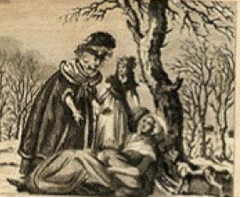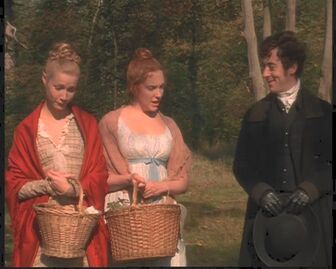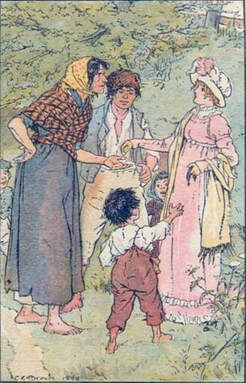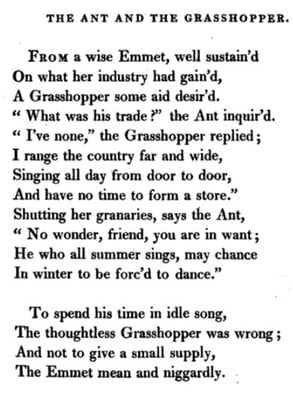| Clutching My Pearls is my ongoing blog series about my take on Jane Austen’s beliefs and ideas, as based on her novels. Click here for the first in the series. |
 Mrs. Leyster rescues a starving widow
Mrs. Leyster rescues a starving widow When catastrophe befell a family, if the mother died in childbirth or the father, as family breadwinner, was injured or died, stricken families relied upon their local parish authorities for relief.
Charity was given out at the parish level, not as part of a national welfare plan. Everybody in your village knew you, and knew your habits, and they knew if you were hardworking and therefore deserving, or if you were improvident, shiftless and dissolute. It also meant that the parish was not obliged to look after strangers who weren't members of the parish. Too many poor people flocking to one place would drive up the poor rates. So, for example, the authorities in the London parishes sent destitute applicants back to their home parishes in Ireland or elsewhere.
In The Two Cousins, (1794) the virtuous Mrs. Leyster finds a woman and her baby unconscious in the snow. She summons her servants to carry them to her home and when the women recovers, Mrs. Leyster learns that she is the widow of a carpenter who broke his arm and then succumbed to consumption (tuberculosis). The widow left her parish to take up a promised job, which fell through. Destitute and starving, she and her child would have died but for their rescue. Mrs. Leyster sets her up in a small cottage business -- but only after first confirming the truth of her story and the respectability of her character.
In Jane Austen's day, there were strict distinctions made between the “deserving poor” and those who brought misfortune upon themselves through laziness and idleness. It was feared that over-generous charity would invite more idleness and vice. But generosity and compassion was expected of the gentry, and this is reflected in Austen's novels...
It's true enough, though. Back then, nobody would describe an alcoholic living on the street with the non-judgmental term "experiencing homelessness." They might reach out to help such a person, as an act of Christian charity, but they would also warn against the vice of drunkenness.
| Georgian and Regency attitudes toward the poor can be summed up in Aesop’s fable of the grasshopper and the ants. Below is a poem from 1809, in which Sir Brooke Boothby uses the dialect word “emmet” for ant. The grasshopper is thoughtless for not preparing for the winter, but the ant is also criticized for not helping the grasshopper. It was the moral duty of rich families to dispense charity in their respective parishes, as we see Emma and Harriet doing in Emma, and Lady Catherine deBourgh doing in Pride and Prejudice. We know that they dispense advice along with the alms. When Austen breaks the fourth wall and directly editorializes to her readers, we must assume that the topic she is talking about, the point she is making, is important to her, otherwise she would not break the fourth wall. So she bestows some rare praise on Emma and while doing so, shares her opinions about poor people. She says approvingly that Emma “was very compassionate; and the distresses of the poor were as sure of relief from her personal attention and kindness, her counsel and her patience, as from her purse. She understood their ways, could allow for their ignorance and their temptations, had no romantic expectations of extraordinary virtue from those for whom education had done so little; entered into their troubles with ready sympathy, and always gave her assistance with as much intelligence as good-will.” | "Niggardly” has a separate etymological derivation from that other word you are thinking of. “Niggardly” is from Old Norse, presumably from the Vikings. |
 Emma is kind to the poor but on this occasion she has another motive, so she brings Harriet along.
Emma is kind to the poor but on this occasion she has another motive, so she brings Harriet along. When Marianne marries Colonel Brandon, she becomes “the patroness of a village,” in other words, she willingly takes on the duty of looking after the well-being of the local people. Perhaps she will be like Austen's much-beloved older friend, Mrs. Anne LeFroy, who lived in the neighbouring parish. As described in Paula Byrne's biography of Austen, LeFroy, a clergyman's wife, personally inoculated the poor in her parish against the smallpox. She started a cottage industry for the women and girls to raise straw for straw plaiting, used in hats and baskets. She opened a school for the village children and taught reading herself.
Even the miserable Mrs. Norris superintends the "poor basket" at Mansfield Park. The ladies of the park make clothing for poor people when they are not embroidering footstools or making fringe. It is a given, a routine activity for genteel women.
Mr. Darcy's housekeeper at Pemberley, Mrs. Reynolds, mentions Mr. Darcy's charity before any other virtue in response to Mrs. Gardiner's “His father was an excellent man."
“Yes, ma’am, that he was indeed; and his son will be just like him—just as affable to the poor.”

They are exotic and unexpected in the quiet village of Highbury, "Nothing of the sort had ever occurred before to any young ladies in the place," and they are not welcome.
Harriet was soon assailed by half a dozen children, headed by a stout woman and a great boy, all clamorous, and impertinent in look, though not absolutely in word.—More and more frightened, she immediately promised them money, and taking out her purse, gave them a shilling, and begged them not to want more, or to use her ill.—She was then able to walk, though but slowly, and was moving away—but her terror and her purse were too tempting, and she was followed, or rather surrounded, by the whole gang, demanding more.
In this state Frank Churchill had found her, she trembling and conditioning, they loud and insolent.
Harriet is shown here as acting like a silly goose, but there is also nothing sympathetic in Austen's portrayal of the gypsies. They are described as impertinent and insolent, and they respond to Harriet's "terror" by surrounding her and demanding more money.
Austen says the gypsies "did not wait for the operations of justice; they took themselves off in a hurry," that is, before Knightley or anyone can get up a posse to drive them out. (Recall that bylaw officers and police do not exist at this period in history.) Austen does not explain or justify the response of the village. She would not have expected her readers to disagree with the response. In a later post, when we get to the topic of Emma and land enclosure, we'll see how this scene is interpreted to make the gypsies into the figures of sympathy.
Austen’s view of the poor was a paternalistic one, or to use the term she would use, a condescending one. Helping the poor--at least, the deserving poor--is one of her implicit values, it is something a good person does, even without explicit reference to religion.
Which is a bit of an odd thing -- Austen was undoubtedly a Christian and a member of the Church of England, but she seldom mentions religion directly. Why is this?
Next post: Decorum in Religion
| In my novel, A Marriage of Attachment, Fanny Price works for a charitable society, teaching sewing skills to poor girls. The "Society for Bettering the Condition and Increasing the Comforts of the Poor" was a real society, patronized by William Wilberforce. The Society looked for practical ways to educate and help the lowest ranks of society. Click here for more info about my books. Update: I revisit the topic of how charity to the poor was handled in 18th century novels in this series of blog posts. |


 RSS Feed
RSS Feed